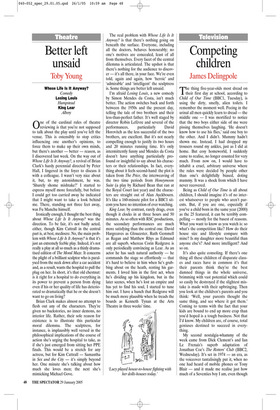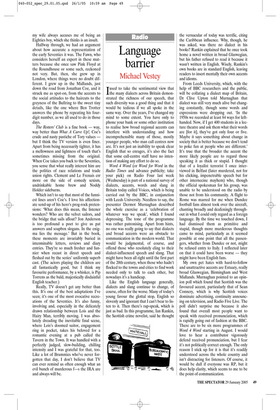Competing children
James Delingpole
The thing five-year-olds most dread on their first day at school, according to Child of Our Time (BBC1, Tuesday), is using the dirty, smelly, alien toilets. I remember the moment well. Peeing in the urinal all men quickly learn to dread — the middle one — I was mortified to notice that the two boys either side of me were pissing themselves laughing. ‘He doesn’t know how to use his flies,’ said one boy to the other. And I didn’t. Mummy hadn’t shown me. Instead, I had dropped my trousers round my ankles, just as I did at home. But cosy homeworld, I suddenly came to realise, no longer counted for very much. From now on, I would have to inhabit a cruel, arbitrary universe where the rules were decided by people other than one’s delightfully biased, doting mummy. It was a shock from which I have never recovered.
Being as Child of Our Time is all about children, I should imagine it’s of no interest whatsoever to people who aren’t parents. But, if you are one, especially if you’ve a child born in the same year (2000) as the 25 featured, it can be terribly compelling — mostly for the basest of reasons. What you want to know as you watch is: so what’s the competition like? How do their house size and lifestyle compare with mine? Is my daughter more beautiful than anyone else’s? And more intelligent? And so on.
It’s also quite consoling. If there’s one thing all these children of disparate classes and races have in common it’s that their parents think they’re the best damned things in the whole universe, brimming with vast potential which could so easily be destroyed if the slightest mistake is made with their upbringing. Then you look at the children’s parents and you think: ‘Well, your parents thought the same thing, and see where it got them.’ Coming to terms with the fact that your kids are bound to end up more crap than you’d hoped is a tough business. Not that I’d know. My children are, of course, total geniuses destined to succeed in everything.
My second nostalgia-whammy of the week came from Dick Clement’s and Ian Le Frenais’s superb adaptation of Jonathan Coe’s The Rotters’ Club (BBC2, Wednesday). It’s set in 1974 — an era, as the voiceover tantalisingly put it, when no one had heard of mobile phones or Tony Blair — and it made me realise just how much of a Seventies boy I am, even though my wife always accuses me of being an Eighties boy, which she thinks is an insult.
Halfway through, we had an argument about how accurate a representation of the early Seventies it was. The Fawn, who considers herself an expert in these matters because she once saw Pink Floyd at the Roundhouse or some such, reckoned not very. But, then, she grew up in London, where things were no doubt different. I grew up in the Midlands, just down the road from Jonathan Coe, and it struck me as spot-on, from the accents to the social attitudes to the haircuts to the greyness of the Bullring to the sweet tiny details, like the one where Ben Trotter answers the phone by repeating his fourdigit number, as we all used to do in those days.
The Rotters’ Club is a fine book — way, way better than What A Carve Up!, Coe’s crude and nasty pastiche of Tory values but I think the TV version is even finer. Apart from being necessarily tighter, it has a mellowness and lightness of touch that’s sometimes missing from the original. When Coe takes you back to the Seventies, you sense that what really interest him are the politics of race relations and trade union rights. Clement and Le Frenais err more on the side of comedy sexism, undrinkable home brew and Noddy Holder sideburns.
Which isn’t to say that most of the funniest lines aren’t Coe’s. I love his affectionate send-up of his hero’s prog-rock pretensions: ‘What does this mean, the listener wonders? Who are the velvet sailors, and the bridge that sails afloat? Jon Anderson is too profound a poet to give us pat answers and soapbox slogans. In the enigma lies the message.’ But in the book, these moments are invariably buried in interminable letters, reviews and diary entries. They’re so much fresher and funnier when recast in direct speech and fleshed out by the series’ uniformly superb cast. (The actors playing the children are all fantastically good, but I think my favourite performance, by a whisker, is Pip Torrens as the bald, majestically disdainful English teacher.) Really, TV doesn’t get any better than this. It’s one of the best adaptations I’ve seen; it’s one of the most evocative recreations of the Seventies. It’s also funny, involving and, especially in the delicately drawn relationship between Lois and the Hairy Man, terribly moving. I was absolutely dreading the inevitable final scene, where Lois’s doomed suitor, engagement ring in pocket, takes his beloved for a romantic evening at a pub called the Tavern in the Town. It was handled with a perfectly judged, slow-building, chilling intensity and I was grateful for that, too. Like a lot of Brummies who’ve never forgotten that day, I don’t believe that TV can ever remind us often enough what an evil bunch of murderous f—s the IRA are and always will be.
















































 Previous page
Previous page